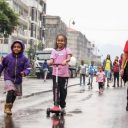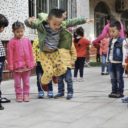Themes
Within the overarching theme Building the Future, our Brussels event will focus specifically on these five topics:
1. Building on Creativity
 Children’s creativity is an important tool to shape the future. On one hand we need to stimulate urban conditions that develop children’s skills to express themselves in creative ways. Artists, museums and schools have a big responsibility to ensure cultural education for children and youth. And on the other hand, we want to apply children’s creative capital to develop innovative solutions for the many problems society is facing today. How can we ensure that the creativity within young people is both developed and translated in the shaping of a better future?
Children’s creativity is an important tool to shape the future. On one hand we need to stimulate urban conditions that develop children’s skills to express themselves in creative ways. Artists, museums and schools have a big responsibility to ensure cultural education for children and youth. And on the other hand, we want to apply children’s creative capital to develop innovative solutions for the many problems society is facing today. How can we ensure that the creativity within young people is both developed and translated in the shaping of a better future?
2. Building on intergenerational cohesion
 Many cities struggle with a lack of cohesion and lack of space. Socially, it is increasingly important to replace age-specific policies in policies that stimulate encounters between all age groups. The future child-friendly city should include teenagers and older people, not to mention grandparents. Spatially, there is an urge to serve different age groups at a time. In today’s context of ever-growing city densities, it is necessary to focus on intergenerational spaces. How can social and spatial interventions facilitate intergenerational contact and social cohesion?
Many cities struggle with a lack of cohesion and lack of space. Socially, it is increasingly important to replace age-specific policies in policies that stimulate encounters between all age groups. The future child-friendly city should include teenagers and older people, not to mention grandparents. Spatially, there is an urge to serve different age groups at a time. In today’s context of ever-growing city densities, it is necessary to focus on intergenerational spaces. How can social and spatial interventions facilitate intergenerational contact and social cohesion?
3. Building on (international) solidarity
 Current times are hard times for many children growing up in Europe and further afield, with migration creating a huge flow of families and children across the globe. We should all overcome the difficulties with integrating newly-arrived citizens. What does it mean for children to grow up in disadvantaged neighbourhoods and how can we improve their living conditions? How do we build on international solidarity that also supports children growing up in other parts of the world where they struggle with war, natural disasters and hunger?
Current times are hard times for many children growing up in Europe and further afield, with migration creating a huge flow of families and children across the globe. We should all overcome the difficulties with integrating newly-arrived citizens. What does it mean for children to grow up in disadvantaged neighbourhoods and how can we improve their living conditions? How do we build on international solidarity that also supports children growing up in other parts of the world where they struggle with war, natural disasters and hunger?
4. Building on participation and democracy
 In this 11th version of the Child in the City World Conference we are particularly keen that children’s voices should be heard. That includes much more than ‘simple’ youth participation. How can we educate children towards becoming responsible members of democratic societies? This topic is about young people’s citizenship, particularly important in the European capital of Brussels. What can European citizenship bring to young people, and what can bring young people themselves to Europe?
In this 11th version of the Child in the City World Conference we are particularly keen that children’s voices should be heard. That includes much more than ‘simple’ youth participation. How can we educate children towards becoming responsible members of democratic societies? This topic is about young people’s citizenship, particularly important in the European capital of Brussels. What can European citizenship bring to young people, and what can bring young people themselves to Europe?
5. Building on young people-friendly urban space
 Outdoor play and opportunities for children’s freedom of movement are still falling. That should not be the case. It is a big challenge in urban planning to make urban space accessible to the youngest citizens in sustainable ways. What good examples do we see of green urban spaces, safe bicycle lanes, attractive playgrounds, smart school yards, well-designed child care facilities that really support children’s development and young people’s freedom of movement?
Outdoor play and opportunities for children’s freedom of movement are still falling. That should not be the case. It is a big challenge in urban planning to make urban space accessible to the youngest citizens in sustainable ways. What good examples do we see of green urban spaces, safe bicycle lanes, attractive playgrounds, smart school yards, well-designed child care facilities that really support children’s development and young people’s freedom of movement?
